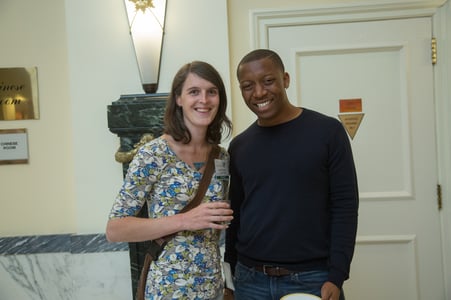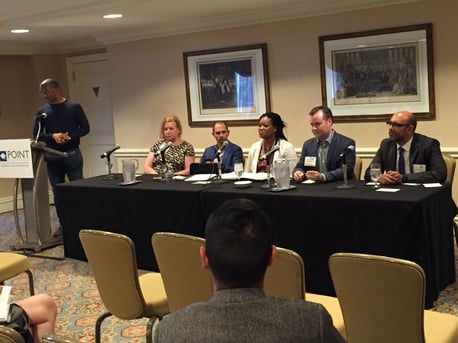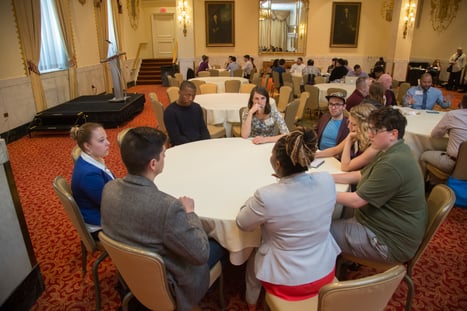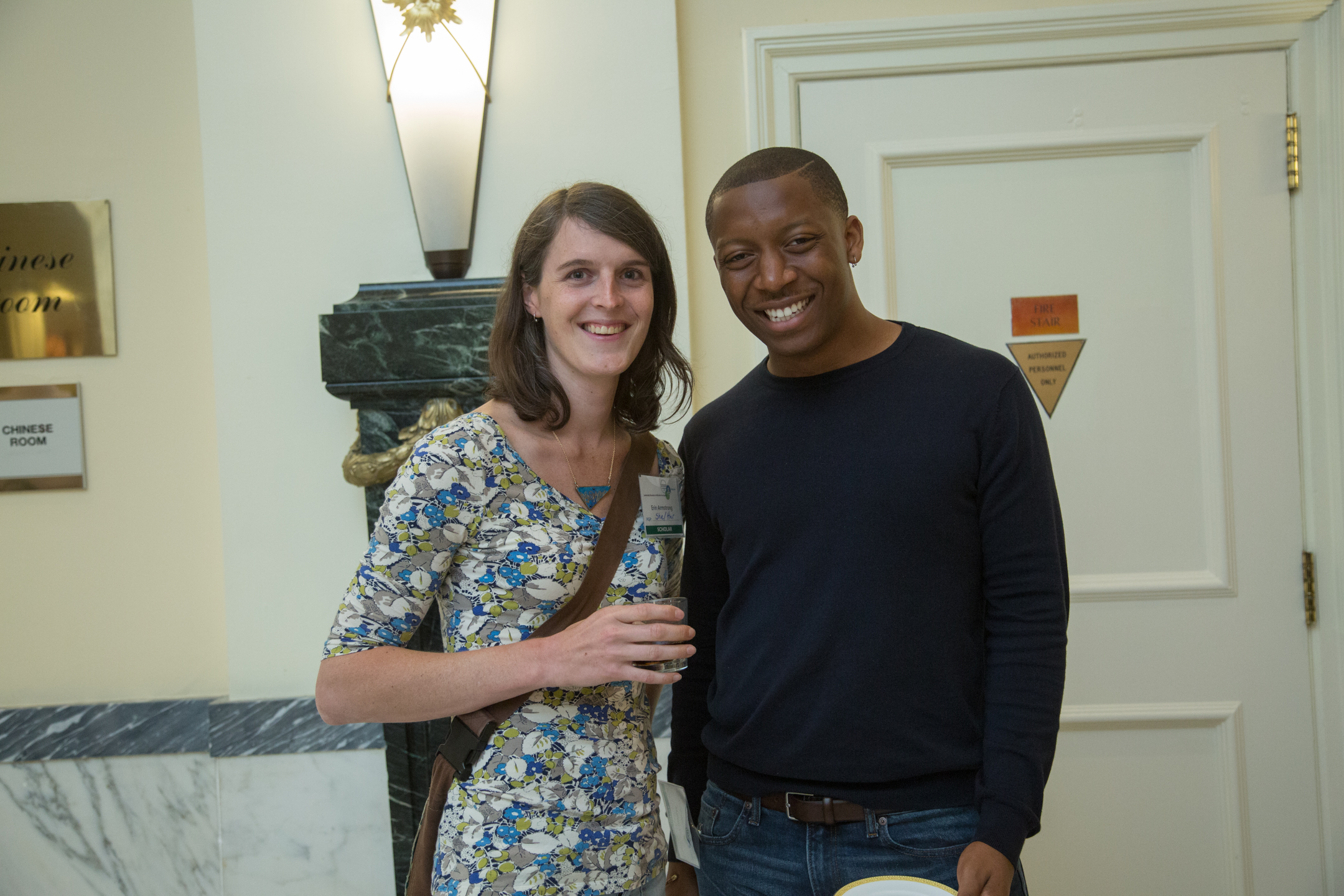A few weeks ago, Point Foundation hosted its Leadership Education & Affinities Development (LEAD) Consortium on Policy & Law, which served as an opportunity for Point Scholars, Alumni, mentors, and guest speakers to convene, exchange ideas, and brainstorm about the current state of LGBTQ advocacy. We were greeted by a number of policy analysts, legal experts, lobbyists, and lawyers who detailed their successes and outlined aspirations.

Point Scholar Erin Armstrong with Wells Fargo Scholar Marcus Lee
Like all Point conferences, LEAD was both thought-provoking and awe-inspiring. I learned quite a bit about gaining political leverage during congressional gridlock, LGBTQ advocacy through the courts, and the battle against anti-trans legislation. I felt especially compelled by Malika Redmond’s mini-workshop on Medicaid expansion in Georgia, during which she explained the key differences between pro-choice advocacy, reproductive rights work, and reproductive justice. And while each of the panelists and presenters had important insights, the contributions of fellow Point Scholars are what resonated with me most. Mia “Tu Mutch” Satya’s comments on intersectional activism in the Bay Area and Erin Armstrong’s unwavering commitment to accruing trans political power were particularly motivating. I left the conference confident that the future of LGBTQ advocacy is in good hands.

Wells Fargo Scholar Marcus Lee introducing panelists for LEAD: Case Studies
However, I also left feeling a bit ambivalent about the direction of LGBTQ advocacy—i.e. the gap between how we are moving forward and how we must move forward, given the current political landscape. What struck me (and prompted my ambivalence) was the extent to which a politics of sameness still orients LGBTQ work, despite the pleas of people of color and the political lessons of the last three decades. By “politics of sameness,” I mean a set of political commitments that renders some event or issue problematic and worthy of response only when its target recognizably shares identities with political decision-makers (e.g. John is a gay man for whom ‘x’ is only an issue if it is clear that ‘x’ negatively impacts gay men). In this way, issues that do not immediately register as “LGBTQ issues” are ignored.
This came up for many of us during the conference when panelists cited gun control as one of the new aims of LGBTQ advocacy. The introduction of gun control into LGBTQ work isn’t what worried me—curbing the distribution of guns is an important aim, especially when figured as a stepping stone toward disarmament and ending violence more broadly. What worried me was the motivation behind its inclusion. Many of the panelists traced LGBTQ concern for gun control back to the Orlando shooting, when LGBTQ people at a gay nightclub were targeted by gun violence; they made little mention of the many gun-related deaths of young black people preceding and following Orlando.
How did the 2016 Orlando shooting become the motivation for a serious reckoning with gun violence, rather than the 2012 shooting of Trayvon Martin, for instance?
What this signals is that the LGBTQ turn toward gun control is not predicated upon a principled stance against violence generally, but a one-dimensional frustration with identifiably anti-gay violence. Again, this budding concern with gun control, on its own, isn’t necessarily an issue (and it may even be admirable). But the motivation behind it reflects a long tradition of mainstream LGBTQ politics in which issues are deemed salient only when decision-makers can identify with its targets.
During breaks between sessions and over meals, I spoke with other Point Scholars about this; through those conversations, it became clear that we must abandon political commitments to sameness, not only because they are exclusionary, but also because they are politically obsolete. In other words, if a politics of sameness continues to orient LGBTQ advocacy moving forward, then our wins will be limited and we will fail to recognize convergence and correlation among seemingly distinct issues.

Point Scholars and Alumni participate in LEAD: Doing the Work
For example, as I have noted, the Orlando shooting prompted great frustration with anti-gay violence and led many to investigate and challenge the laws governing firearm sales in Florida. However, those aiming to confront violence in all of its forms have gone beyond gun control to uncover other factors contributing to the death toll in Orlando—like Cherno Biko, whose concern with the connections between police violence and hate violence pushed her to investigate how many of the Orlando victims were actually killed by police officers. And while many have applauded attempts by House Democrats to pass what they think is commonsense gun control policy in the wake of Orlando, others suggest that we dig deeper and recognize the broader implications of those policies—like the consequences of using a racist database (the “Terror Watch List”) to develop restrictions on gun sales.
A politics that takes issue with an injustice in the abstract—one in which decision-makers don’t have to identify with or be the same as the targets—could expand our political visions. This is not to say that we should abandon specificity—thinking specifically about the issues black/trans people face, for instance, is essential. But one need not be a black/trans person in order to mobilize against those issues.
As we move against this tide of anti-trans legislation, the resurgence of explicit racism in formal politics, and what seems like a never ending saga of anti-black police violence, it has become increasingly evident that we simply can’t afford fractures within our communities; we must dig deep and build solidarities with one another, and I feel so inspired by the many members of the Point family doing just that. I’m eager to see what we build together.
For more photos from the Leadership Education & Affinities Development (LEAD) Consortium on Policy & Law, check out our album on Facebook.

This post was written by Wells Fargo Scholar Marcus Lee
Marcus is a member of the Class of 2015 of Morehouse College, a Mellon Mays Research Fellow, a graduate student in political science at The University of Chicago, and a member of a variety of community organizations and initiatives oriented toward racial justice, gender equity, and sexual liberation. Learn more about Marcus here.

